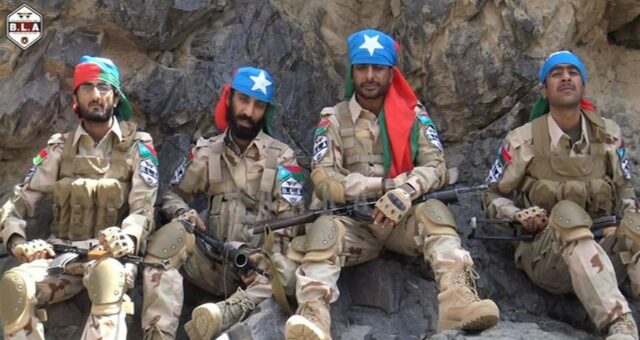
Baloch Liberation Army Kidnapping Fails to Lead to Negotiations With Islamabad
Publication: Terrorism Monitor Volume: 20 Issue: 24
By:

A breakaway group of the Baloch Liberation Army (BLA), which is headed by a student-turned-leader named Bashir Zaib, kidnapped two junior officers of Pakistan’s military on September 25 in the restive southwestern Balochistan province. The abductees were a junior military officer and an intelligence officer in the remote mountainous district of Harnai. This district is around 105 miles from the provincial capital, Quetta (The Balochistan Post, September 26).
The Pakistani military quickly responded by dispatching gunship helicopters to the scene. One of the helicopters crashed, however, killing six officers, including two with the rank of major (Dawn, September 26). However, the BLA, which seeks separation from Pakistan, took credit for downing the helicopter. It claimed that “[i]n a battle with forces that had come for the rescue of arrested personal, a Pakistani helicopter was shot down killing all six personnel aboard” (Twitter/@TBPEnglish, September 26).
The BLA insurgents ended up fleeing the scene with the two abducted Pakistan army officers. Later in a detailed statement, Jeeyand Baloch, a purported BLA spokesperson, stated his group was willing to hand over the officers in exchange for “political prisoners” held by Pakistani authorities (Voice of America Urdu, October 7). The BLA failed to provide details about the prisoners it was ready to receive in exchange for the two abducted officers. However, it is likely the group was seeking the release of Gulzar Imam, who is a Baloch militant leader and the head of the recently formed Baloch Nationalist Army (BNA). Gulzar was reportedly arrested in early May in Turkey under mysterious circumstances (BBC Urdu, November 23). Whatever the case, the BLA offer indicated that the group is struggling to win the release of some of its hardcore and high-profile members, who currently remain in the custody of Pakistani authorities.
The BLA’s Kidnapping Record
Earlier in July, the BLA militants kidnapped a Pakistani army colonel in Ziarat, a tourist hotspot in Balochistan (BBC Urdu, July 14). However, the insurgents were quickly chased by the Pakistan army. Thus, they had to escape and killed the officer (Dawn TV, July, 17).
Kidnapping government officers and military personnel to exchange for militants has been a tradition of the Afghan Taliban and Pakistani Taliban, but the Baloch insurgents have only recently adopted this tactic. In this latest September 25 case, the BLA not only succeeded in capturing two Pakistani army officers and taking them to the group’s hideouts, but also later offered the government a prisoner swap (Voice of America Urdu, October 7). This offer came as a surprise because the Baloch militants have not been willing to participate in any negotiations with the Pakistani authorities in the past.
Pakistan did not accept the BLA offer; neither the government nor the military has responded to the BLA’s offer for a prisoner swap. Instead, the army launched an intensive crackdown in the mountains of the Bolan district on October 31 and arrested 13 people, including children and women. They were released, however, after a backlash from civil society and civil rights activists (Twitter/@KiyyaBaloch, November, 4). The Pakistani military still claimed it targeted BLA camps in those operations, which, in the end, still could not secure the release of the abducted officers (Dawn, November 12).
The BLA’s Hostage-Taking Techniques
Family members of the abducted soldiers, who are from Pakistan’s most populous Punjab province, have been protesting and pressing the government to secure the release of the hostages (The Balochistan Post, October 29). The government has not responded to their protests, however. Pressure mounted when the BLA also released a video of the two seized officers and stated that the group would kill the hostages by November 4 if Pakistan did not respond to the group’s offer (The Balochistan Post, October 23). The BLA’s offer for a prisoner swap was also an opportunity to pave the way to hold direct peace talks and possibly reduce or even end the conflict with Pakistani security forces that began in the early 2000s (Daily Times, October 17).
The BLA has also been behind several coordinated attacks on Chinese nationals and Pakistani security forces and has been carrying out suicide bombings, including on the Chinese Confucius Institute in Karachi, which killed three Chinese citizens and their Pakistani driver (Terrorism Monitor, September 23). The Chinese government has been “deeply concerned” about reports of increasing violence and sporadic attacks on its nationals in Pakistan by Baloch militants, and especially BLA. President Xi Jinping openly expressed this when Pakistani Prime Minister Shehbaz Sharif was on a two-day visit to China to meet with Xi (Ministry of Foreign Affairs of the People’s Republic of China, November 2).
Conclusion
The Pakistani government always has maintained a passive attitude in dealing with the Baloch separatist conundrum. However, the use of force in response to the militants’ offer highlights Pakistan’s disinterest in negotiations and the possibility of further deterioration of the situation in Balochistan, which can threaten Chinese interests and Balochistan’s own internal security. Notably, Pakistan’s response to the negotiation offer for prisoners of Islamist militants, such as the Taliban, has been different (Pakistan Standard, November 21). This may be because Pakistan has long used Islamist insurgents as strategic assets in Indian-held Kashmir and Afghanistan. In addition, Islamists, such as the Taliban, want to impose sharia law in Pakistan, which some conservative Islamist generals support even within the Pakistan army.
However, secular Baloch insurgents seek a completely autonomous state by breaking up Pakistan altogether. The Pakistani government and army will never allow this to occur. The refusal to hold talks with the Baloch militants and address the Baloch minority’s longstanding grievances nevertheless indicates the situation will not return to normalcy in southwestern Pakistan anytime soon.



